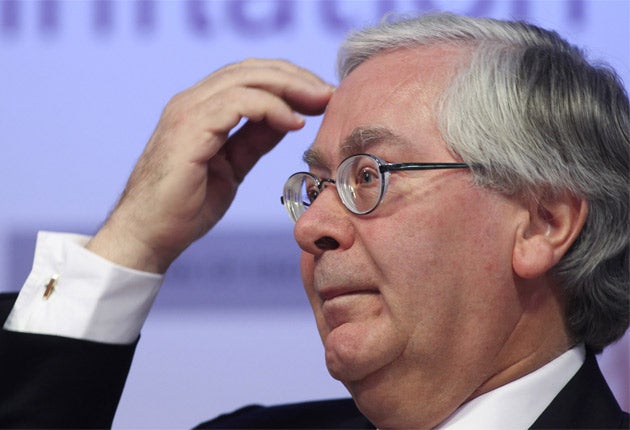David Prosser: The Governor and the the Bank of England's political neutrality

Your support helps us to tell the story
From reproductive rights to climate change to Big Tech, The Independent is on the ground when the story is developing. Whether it's investigating the financials of Elon Musk's pro-Trump PAC or producing our latest documentary, 'The A Word', which shines a light on the American women fighting for reproductive rights, we know how important it is to parse out the facts from the messaging.
At such a critical moment in US history, we need reporters on the ground. Your donation allows us to keep sending journalists to speak to both sides of the story.
The Independent is trusted by Americans across the entire political spectrum. And unlike many other quality news outlets, we choose not to lock Americans out of our reporting and analysis with paywalls. We believe quality journalism should be available to everyone, paid for by those who can afford it.
Your support makes all the difference.Outlook In handing the Bank of England its independence in 1997, the then Labour Government effectively made a deal. It gave up its right to control the levers of monetary policy; the corollary of that surrender was that the Bank would leave fiscal policy to the elected government of the day.
Staying off each other's turf requires the Bank and the Government to be careful about what they say. Were George Osborne to make a speech suggesting the Bank ought to raise interest rates, for example, he would expect it to cause a storm. Interest rates are a matter for the Bank.
Mervyn King, the Governor of the Bank of England, understands the game perfectly well too, and has generally been very cautious about any remarks he makes about fiscal policy. Until recently, that is. About a year ago, the Governor began to put that caution to one side, with a series of interventions on fiscal policy that have continued to this day. He cannot now besurprised that critics are beginning to question whether he has overstepped the mark.
The interventions began with a Treasury Committee meeting in which Mr King made it clear he did not think the Labour Government had set out sufficiently robust plans for tackling the deficit. They continued after the election. Nick Clegg says he changed his mind about his opposition to the speed and scale of Conservative spending cuts following a briefing from the Governor. And they continue to this day. Mr King publicly backs the Coalition's deficit reduction programme.
The Governor said yesterday that it would be an even biggerstory were he to claim he was "not bothered about the biggest peacetime fiscal deficit in our history". He also pointed out that he has avoided making any comments about the role of spending cuts and tax rises in bringing down debt.
Both are fair points. But it does feel as if the Governor's attitude changed a year ago – that he became just a little more willing to stray into political territory. And as long as Mr King remains there, he can expect people to seek to make him feel uncomfortable.
Join our commenting forum
Join thought-provoking conversations, follow other Independent readers and see their replies
Comments